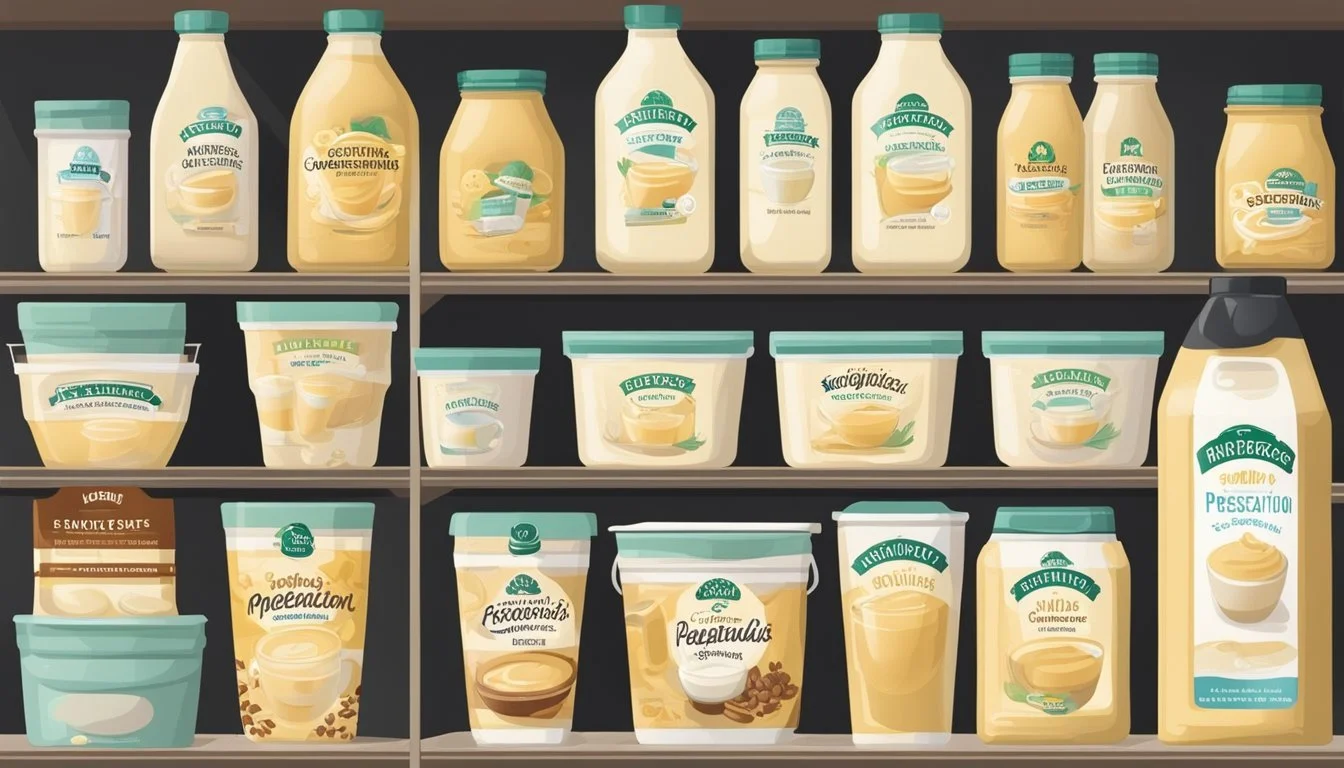Eggnog Substitutes
Top Alternatives for Your Holiday Drinks
Eggnog has long held its place as a festive staple during the holiday season, often enjoyed in the company of family and friends. Traditional eggnog, rich and creamy, is a blend of milk, sugar, whipped eggs, and spices, frequently spiked with a splash of rum or bourbon. Its unique flavor and velvety texture are synonymous with the warmth and joy of holiday traditions.
However, not everyone imbibes in traditional eggnog, either due to dietary restrictions, personal taste preferences, or health concerns. Eggnog substitutes offer a way for more people to partake in the seasonal cheer. These alternatives range from dairy-free and vegan versions using nut or soy milk, to lighter options that lower calorie and fat content without sacrificing the beloved eggnog essence.
Recognizing the wide range of preferences and needs, the market has adapted to include eggnog substitutes that ensure everyone has a chance to enjoy a version of this holiday classic. From ready-to-drink store-bought variations to homemade recipes that allow for control over the ingredients, eggnog substitutes have become an integral part of modern holiday tradition, ensuring that the eggnog experience is accessible to all.
Understanding Eggnog
This section examines the traditional makeup of eggnog, its nutritional aspects, and its cultural importance during festive occasions.
Traditional Eggnog Ingredients
Traditional eggnog is a rich, creamy beverage made from a harmony of eggs, milk, and cream, sweetened with sugar. Essential flavorings in eggnog include nutmeg, vanilla, and often cinnamon, contributing to its distinctive taste. The drink is frequently augmented with alcohol, typically rum, brandy, or bourbon, to add warmth and depth.
Ingredient Typical Role in Eggnog Eggs Base for texture and richness Milk Adds creaminess Cream Contributes to the thick consistency Sugar Sweetness Nutmeg Signature spice Vanilla Flavoring Cinnamon Additional spice Alcohol Flavor enhancer and warmth
Health Considerations of Eggnog
Eggnog is often high in calories, fat, and cholesterol due to its generous use of cream and eggs. For those monitoring their intake of these elements, it's important to be mindful of eggnog's nutritional content. However, eggnog also provides certain nutrients such as protein, calcium, and potassium. Some store-bought alternatives, like soy or rice nog, offer lower calorie and fat content.
Nutrient Concern Benefit Calories Weight management Energy provision Fat Heart health Satiety and taste Cholesterol Cardiovascular risk Necessary for bodily functions Protein Muscle repair and growth - Calcium Bone strength - Potassium Blood pressure regulation -
Cultural Significance of Eggnog
Eggnog has a storied place in holiday traditions, often associated with the holiday season and gatherings of family and friends. Its origins are debated, but it is entrenched in the festive culture, signifying warmth, comfort, and conviviality. The ritual of preparing and enjoying eggnog can be an important annual tradition for many, signifying the start of celebratory activities and togetherness.
Eggnog Substitutes Overview
In seeking alternatives to traditional eggnog, one may consider dairy-free products, non-alcoholic variations, or low-calorie options to suit different dietary needs and preferences. The taste and consistency of eggnog can be replicated using various ingredients, offering enjoyable alternatives to the classic holiday beverage.
Dairy-Free Alternatives
For those who prefer dairy-free options or have lactose intolerance, plant-based milks provide a viable substitute for eggnog. Key replacements include:
Almond milk: A versatile choice that imparts a nutty flavor and can be sweetened with sugar or natural sweeteners like maple syrup.
Coconut milk: Thick and creamy, it closely mimics the richness of heavy cream typically found in eggnog.
Cashew milk: With its inherent creaminess, cashew milk serves as a good base for homemade vegan eggnog.
Oat milk: An allergy-friendly alternative that adds a subtle sweetness.
Non-Alcoholic Variations
Non-alcoholic versions of eggnog maintain the familiar flavor while omitting the spirits. To achieve this, one may:
Use alcohol-free vanilla extract to enhance the taste without the alcohol content.
Utilize non-alcoholic eggnog mixes available in stores, following the package instructions for preparation.
Low-Calorie Options
Individuals monitoring their calorie intake can enjoy eggnog with fewer calories by opting for:
Soy nog or rice nog: These alternatives contain significantly less fat and fewer calories compared to standard eggnog.
Lighter plant-based milks: Selecting almond milk or other plant-based milks that are labeled as "light" or "unsweetened" can reduce calorie count.
By considering these alternatives, consumers can enjoy the holiday spirit with a cup of eggnog that aligns with their dietary preferences and restrictions.
Homemade Eggnog Substitutes
When the holiday season approaches, a rich and creamy glass of eggnog is often a festive staple, but not everyone can or chooses to consume eggs. The following sections outline specific recipes and techniques to create satisfying homemade substitutes that capture the essence of traditional eggnog without using this key ingredient.
Eggnog Substitute Recipes
Eggless Eggnog: To replicate the traditional flavor without eggs, a simple recipe combines the following:
Milk: 5 cups (use sweetened or unsweetened as preferred)
Vanilla Pudding Mix: 1 package to help thicken the mixture
Sugar: To taste
Vanilla Extract: 1 teaspoon for that classic eggnog flavor
Cinnamon: 1/2 teaspoon, ground
Nutmeg: a pinch of freshly grated nutmeg adds authenticity
Rum-Flavored Extract: 2 teaspoons to mimic the common alcohol enhancement, without actual spirits
Instructions: Whisk ingredients together and cook on the stove over medium heat until the mixture starts to thicken. Chill in the refrigerator for a creamy texture.
Cooking Techniques
To achieve the desired thickness and creaminess similar to eggnog, the mixture usually needs to be heated gently on the stove. This process helps integrate the sugar and allows the pudding mix or cornstarch -- if used as a thickener -- to swell and thicken the blend. The goal is to warm the substitute to just below a simmer, avoiding boiling to prevent curdling. After heating, it is essential to refrigerate the drink, which not only cools it but also continues to thicken its consistency. It's best served chilled; however, those who prefer a warm beverage can gently reheat it before serving.
Rate of Chill: A minimum of 1-2 hours in the refrigerator is recommended for the eggnog substitute to reach optimal thickness and flavor development.
Storage Tips: If not consumed immediately, store the eggnog substitute in a closed pitcher or container in the fridge. For longer storage, freezing is not recommended as it could alter the texture upon thawing.
Store-Bought Alternatives
When one is seeking convenient options for eggnog around the holidays, store-bought alternatives provide an array of choices catering to different dietary needs and taste preferences. It is important for shoppers to consider taste, nutritional content, and suitability for their family or guests when making selections.
Selecting Commercial Eggnog Substitutes
To select an appropriate commercial eggnog substitute, one should carefully review the label for nutrition information, noting factors such as calories, sodium, and presence of allergens, to ensure it aligns with dietary needs. Reading reviews and comments can also aid in determining which products rate highly for taste.
Calories: Compare calorie count to find a balance between indulgence and nutrition.
Sodium: Check sodium levels if managing blood pressure is a concern.
Nutrition Information: Look for options that have fortified vitamins and minerals if additional nutrition is desired.
Label: Examine the label for certifications that match dietary preferences, such as USDA organic or non-GMO.
Comparison of Popular Brands
Shoppers can find a variety of eggnog substitutes from brands that offer a spectrum of flavors and nutrition profiles. Here is a comparison of a few popular brands commonly found in stores:
Brand Type Calories per Serving Attributes Califia Farms Almond Milk Holiday Nog Varies by product Dairy-free, often lower in fat and sugar Soy Nog Soy-based Nog Approximately 50% less calories compared to regular eggnog Lower fat, vegan-friendly Rice Nog Rice-based Nog Lower than regular eggnog Suitable for those with dairy and soy allergies, vegan Non-Alcoholic Eggnog Mix Pre-mixed Non-Alcoholic Nog Varies by product Convenient, family-friendly, just add milk
These alternatives are not only suitable for those with specific dietary restrictions but also for individuals looking to indulge in festive treats without straying from their health goals. The taste of these products varies, but they often aim to mimic the traditional eggnog flavor, making them suitable for holiday gatherings and parties. When shopping, consumers should look for tags or promotional displays that might highlight new or seasonal offerings.
Innovative Uses for Eggnog Substitutes
Eggnog substitutes offer a versatile way to infuse traditional holiday flavors into a variety of treats and beverages as well as cooking and baking recipes. These substitutes generally maintain the rich flavor profile of classic eggnog while providing options for those with dietary restrictions.
Eggnog-flavored Treats and Beverages
Latte & Coffee: Adding an eggnog substitute such as soy nog or rice nog to a latte or regular coffee can give it a festive twist. These options can bestow the creamy texture and warm spices of eggnog without the extra fat or calories.
Hot Chocolate: Stirring in a splash of eggnog substitute provides hot chocolate with a nutty flavor and a slightly different dimension of sweetness.
Vanilla Chai Tea: Those looking for a non-dairy beverage with a hint of eggnog can mix in a bit of soy nog or rice nog to their vanilla chai tea, enhancing it with a richer mouthfeel and complimentary spices.
Cooking and Baking with Eggnog Substitutes
French Toast: One can soak the bread in an eggnog substitute mixture before frying, enriching the final product with a distinct eggnog taste and creamy consistency.
Baking: Eggnog substitutes can be used in recipes for cakes, muffins, or bread, providing a seasonal flavor without using traditional eggnog.
Frosting: Blend an eggnog substitute into frosting for a unique taste to top off cakes and cupcakes.
Garnish: A dash of nutmeg or cinnamon on top of an eggnog-inspired treat not only adds to the visual appeal but also intensifies the aroma and taste.
Storage and Preservation
When substituting for eggnog in recipes, ensuring the freshness and proper preservation of your alternative is crucial. To maintain quality, the substitutes must be stored appropriately, taking into account refrigeration, freezing, and the use of airtight containers to extend shelf life.
Best Practices for Freshness
For optimal freshness, most eggnog substitutes should be refrigerated at or below 40°F (4°C) in an airtight container. This method slows down the growth of bacteria and maintains the quality of the substitute. A key aspect of maintaining freshness is to store the substitute as soon as possible after purchase or preparation. Homemade substitutes may lack preservatives found in commercial products, so one should consume them within a few days.
Shelf Life:
Refrigerated Commercial Substitute: Up to the date indicated on the packaging
Homemade Substitute: 2-3 days
Freezing and Thawing Methods
Some eggnog substitutes can be frozen, extending their viability well beyond refrigeration times. To freeze, one should pour the liquid into freezer-friendly plastic containers or thick resealable freezer bags, leaving an inch of space to allow for expansion. Thawing should be done in the refrigerator to maintain quality, and one must shake or stir the substitute before using, as separation is likely.
Freezing Instructions:
Pour substitute into container, leaving space at the top
Seal and label with the freeze date
Freeze for up to 6 months for best quality
Thawing Instructions:
Thaw in refrigerator for several hours or overnight
Stir or blend if separation occurs after thawing
It's imperative that once thawed, the substitute should never be refrozen. After thawing, it should be consumed within a day or two for best taste and safety.
Nutritional Considerations
When exploring eggnog substitutes, consumers must evaluate their nutritional impact, including caloric and fat content, the presence of essential vitamins and minerals, as well as allergen information and compliance with dietary restrictions.
Caloric and Fat Content
Traditional eggnog is known for its high calorie and fat content, primarily from the heavy cream and sugar used in its making. For those seeking lighter alternatives, products such as soy nog or rice nog can provide a substantial reduction in these levels. Soy-based and rice-based nogs typically have about half the calories and less fat compared to traditional eggnog.
Traditional Eggnog: Approximately 223 calories and 11 grams of fat per serving.
Soy/Rice Nog: Roughly 100-150 calories and 2-4 grams of fat per serving.
It is important to note that the saturated fat content also sees a significant decrease in these plant-based options.
Vitamins and Minerals Profile
Substitutes for eggnog may vary in their vitamin and mineral profiles, depending on their ingredients. Dairy-free alternatives often fortify their beverages with calcium and vitamins, such as vitamin D and B12, to mimic the nutritional benefits of milk. Additionally, plant-based eggnog alternatives may lack cholesterol, which is found in the eggs and dairy of traditional eggnog.
Calcium: Essential for bone health, often added to non-dairy alternatives.
Vitamin D and B12: Commonly fortified in dairy-free eggnogs.
Potassium and Iron: Presence varies by product; consumers should check nutrition labels.
Allergens and Dietary Restrictions
Individuals with dairy or egg allergies, or those following a vegan diet, may look for eggnog substitutes that cater to their dietary needs. Plant-based alternatives typically exclude allergens such as dairy and raw eggs, significantly reducing the risk of foodborne illness and allergic reactions. Furthermore, many substitutes are designed to be inclusive, respecting dietary restrictions without compromising on the festive experience of enjoying eggnog.
Dairy-Free: Soy, rice, and almond-based alternatives provide options for those avoiding dairy.
Egg-Free: Many substitutes omit raw eggs, catering to vegans and those with egg allergies.
It's recommended that all consumers enjoy eggnog in moderation due to its rich nature, regardless of the substitute chosen. For complete nutrition information, checking the product label is always advised.
Engaging with the Community
In the spirit of the holiday season, community engagement through sharing eggnog alternatives has become an integral tradition for many. They find joy in connecting with family, friends, and fellow eggnog enthusiasts to exchange ideas and reviews, ensuring everyone can savor the festive cheer regardless of dietary preferences.
Sharing Recipes and Experiences on Social Media
Social media platforms like Instagram have become a bustling hub for those who wish to share their personal spins on traditional eggnog recipes. Users post photos and detailed descriptions of their non-alcoholic or dairy-free concoctions, often using hashtags such as #EggnogSubstitute or #DairyFreeHoliday to reach a wider audience. They tag their friends or invite others to comment with their own variations, creating an interactive and supportive online community.
Platforms Utilized: Instagram, Facebook, Pinterest
Common Hashtags: #EggnogSubstitute, #DairyFreeHoliday, #HolidayRecipes
Interaction Methods: Comments, Shares, Likes
Reading and Posting Reviews
Reviews are the cornerstone for those seeking the best eggnog substitute for their holiday party. Families pore over comments and ratings for store-bought alternatives like soy nog or rice nog, gauging the opinions of others to find a suitable match for their needs. On sites like Allrecipes, users post reviews detailing their experiences, which aids others in making informed decisions on whether to try a recipe for a holiday gathering.
Review Aspects: Taste, Consistency, Overall Experience
Review Sites: Allrecipes, Mayo Clinic Health System, Chef's Resource
Posting Frequency: Often increased during the holiday season
Environment and Sustainability
The production and consumption of eggnog have implications for the environment. The use of plant-based milk in vegan eggnog plays a role in promoting sustainability.
Impact of Eggnog Production
Traditional eggnog production relies on dairy milk and eggs, industries that are resource-intensive with significant environmental footprints. Dairy farms generate considerable amounts of greenhouse gases, particularly methane, and demand substantial freshwater resources. Similarly, egg production often involves high levels of carbon emissions and water use, further emphasizing the environmental concerns.
Greenhouse Gas Emissions: Dairy cows contribute to methane generation.
Water Footprint: Both dairy and egg production demand considerable amounts of water.
Land Use: These industries require large tracts of land, impacting biodiversity.
Eco-friendly Substitutes
Vegan eggnog offers a more sustainable alternative to traditional eggnog, primarily due to the use of plant-based milks. Plant-based milk, such as soy, almond, and oat, generally requires less water, and their production tends to emit fewer greenhouse gases than dairy milk.
Soy Milk: Often made from locally cultivated soybeans, reducing transportation emissions.
Almond Milk: Uses more water for irrigation but less in processing, with fewer emissions overall.
Oat Milk: Growing appeal for sustainability due to its lower environmental impact in terms of emissions and water use.
The eco-friendly profile of vegan eggnog aligns with the growing environmental consciousness among consumers who seek to reduce their carbon footprint during the holiday season and beyond.
Conclusion
When considering a substitute for eggnog, either in recipes or as a beverage, one has a variety of options. Substitutes offer a range of nutritional benefits and can cater to different lifestyles, such as vegan or low-fat diets. Homemade eggnog alternatives give individuals the flexibility to adjust ingredients according to their specific needs while maintaining the rich and creamy qualities of traditional eggnog.
Yogurt: A smart option, especially Greek yogurt, for a tangy flavor and creamy texture.
Evaporated Milk: Can be diluted with water to mimic eggnog's consistency.
Non-dairy alternatives: Soy nog, rice nog, and vegan eggnog made with plant milks or nut milks, often present a lower calorie and fat content, beneficial for those monitoring their intake.
Whether for health reasons, personal preference, or out of necessity, each substitute brings a different dimension to both drinks and culinary creations. Store-bought eggnog and its alternatives usually come with clear nutrition information labels, assisting consumers in making informed decisions.
Those yearning for the tradition of eggnog without the associated ingredients have the luxury of choice without compromising on taste experience. In summary, the market's variety ensures that every preference and requirement is acknowledged, affirming that the essence of the holiday favorite can be preserved in multiple forms.










